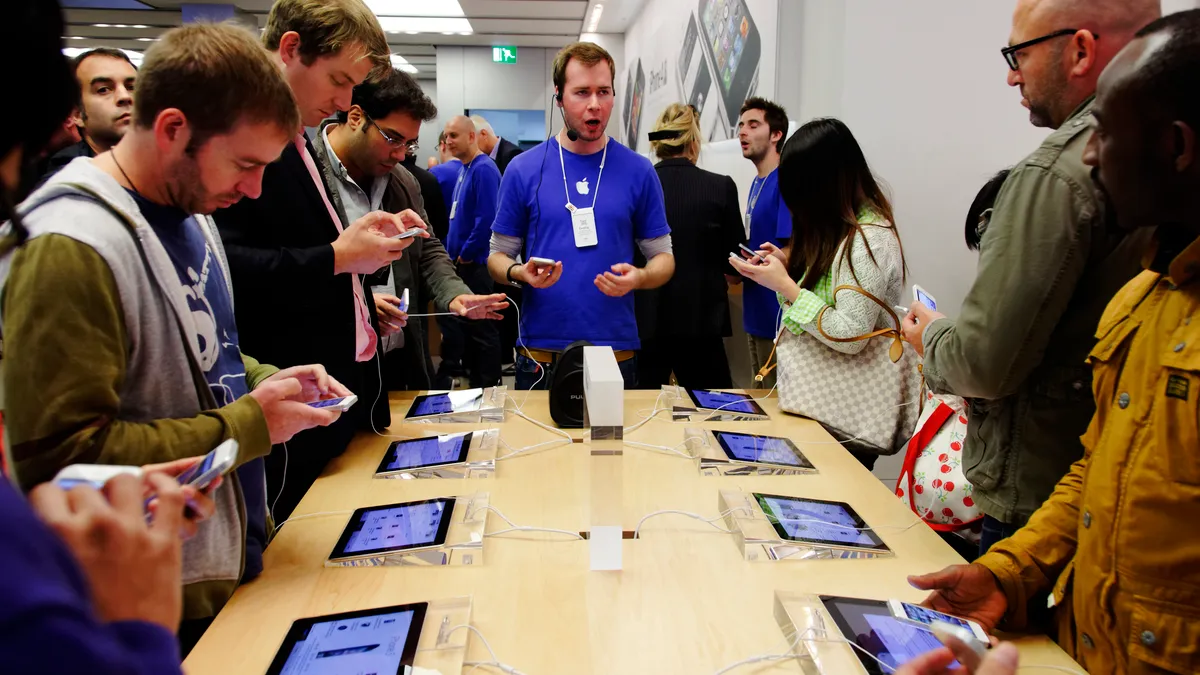Anything Apple does garners the attention of millions. Experts predict the iPhone 8 release — or iPhone X if rumors are to be believed — could push the company into the first trillion dollar valuation in the world, beating the likes of Amazon and Alphabet to the punch.
The product release on Tuesday will draw the eyes of many, but perhaps far more impactful than a new phone design or valuation benchmark will be the release of iOS 11. Businesses have prepared for weeks, if not months, to ensure the operating system revamp does not disrupt applications, and some major changes to the software are forcing organizations to significantly modify products.
An Apple a day keeps the competitors away
Apple currently dominates the mobile market with 82% of all mobile activities performed on iOS devices, according to recent analysis from Egnyte. The company lags in the desktop activities sphere, with only one-quarter of activities on its devices, and is undoubtedly looking to improve this number and cut into Windows' commanding lead.
Both platforms are important for businesses because between corporate provisioned devices and offices with BYOD policies, large operating system rollouts require significant preparation to ensure employee and user application access runs smoothly across devices.
Even minor updates to the system can turn into daunting challenges for businesses because of all the variables at play, said Mark Lorion, president and GM at Apperian, in an interview with CIO Dive.
In the push for mobility, Apple has set up the iPad Pro to replace laptops, said Lorion. The new operating system release includes several features specifically aimed at the device such as drag-and-drop services, a new Files application and a larger applications dock. As these features increase the functionality of the iPad, Apple is creating a "laptop killer," said Lorion.
Apple barely beat out Samsung in phone sales last year, and the company is hoping this year's product improvements will solidify its place as head of the market, according to IDC. Many legacy apps and devices will be cut off from support with the new operating system, reinforcing the focus on competing with modern devices as the company prepares to unveil what many believe is its most important phone yet.
You can lead a developer to 64-bit, but you can't make him code
Apple developers get access to beta versions of iOS systems prior to the launch and received access to the most recent versions at the end of August. Most companies have steadily worked on major updates to applications for months because of fundamental changes to system architecture.
Apple has made it known since its last Worldwide Developers Conference that under iOS 11 all apps and updates must meet 64-bit instead of 32-bit requirements by January 2018 on iPhones and June 2018 on Macs. After these deadlines, any apps running on 32-bit will fail to launch. Changes like this create a sense of urgency and make early preparation critical for businesses.
IT departments have control over when their business moves to the new operating system, but time is nevertheless of the essence because more than corporate devices are at play, said Lorion. BYOD workers, contractors and business partners are among those who will update devices to iOS 11 independently of a company, pressuring the organization to ensure systems are compliant as soon as requirements change.
While early beta versions allow companies to make the large-scale changes, there are always a few last minute changes Apple puts in before the release, according to Lorion. Companies may scramble to fix apps after late changes, but these tend to be minor fixes; companies that made retooling systems for known changes a priority should not have trouble ensuring apps are compliant.
Many companies also turn to third-party software to help with the transition. These third parties can tell customers when enterprise applications on their platform are not compliant, sometimes fixing the issue themselves and other times simply informing the customers what changes need to be made by development teams, said Lorion.
Behind closed doors
Apple releases are known for the spectacle accompanying them, especially because the unveiled features are secrets to everyone from consumers to major partners of the company. Everyone sees and gets the update at the same time, save for the occasional leak.
"I think Apple realizes that they have such a large base of end users, in other words consumers, that they treat everyone the same," said Lorion. This move often frustrates extremely large companies that may expect special treatment because of their relationship with Apple.
Apple has already made major structural changes to the iOS architecture public, so businesses should already have most major changes out of the way. The release will undoubtedly include many minor changes, but the primary reveal is the new physical models of the next generation devices.



















